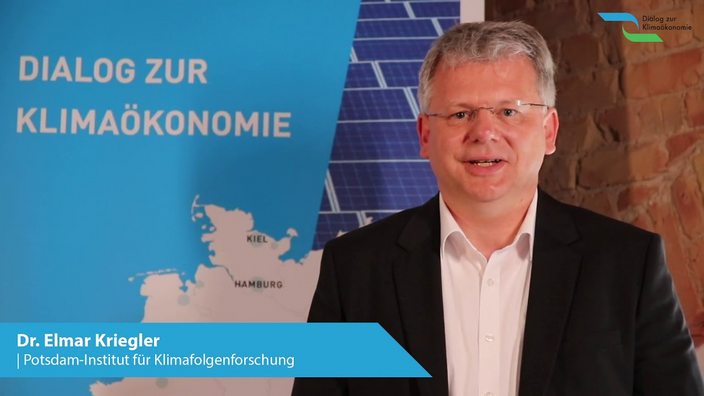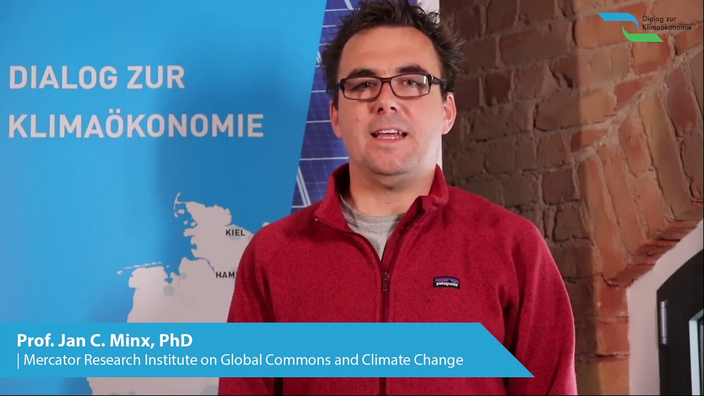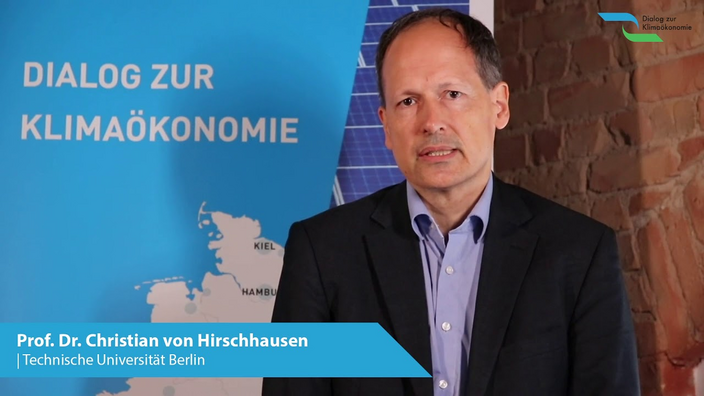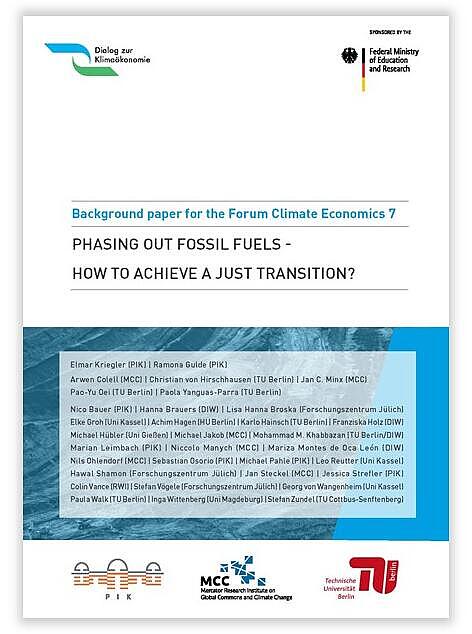Forum Climate Economics 7
Fossil Fuel Phase-out and Just Transition
Forum Climate Economics 7 in a virtual format
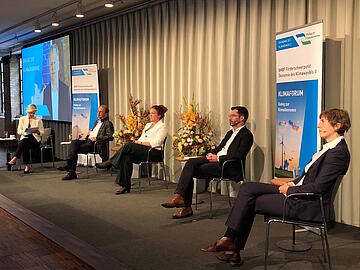
On October 12th, 2020 another edition of the Forum Climate Economics was on "Phasing out fossil fuels - How to achieve a just transition". Due to the corona pandemic, the event took place in a new virtual format. More than 100 representatives from politics, economy, civil society, and science followed the livestream and participated in the discussion via various live polls and chat tools. Against the backdrop of the tightened European climate protection goals within the framework of the EU 2030 climate target, participants of the Forum discussed one of the key components for achieving them: the phasing out of fossil fuels. Without this phase-out, the goals of the Paris Agreement cannot be achieved.
Stefanie Hiesinger explains EU Commission goals in a keynote speech
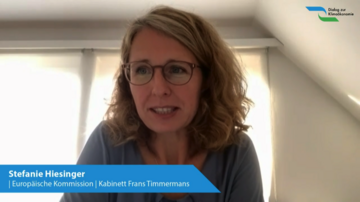
Stefanie Hiesinger, member of the cabinet of Frans Timmermans, Executive Vice-President of the European Commission for the EU Green Deal, joined the virtual debate live from Brussels. In addition to the consensus on the goal of climate neutrality in 2050, she emphasized the co-benefits of fossil fuel phase-out, such as improved air quality and the reduction of environmental damage, which have a direct impact on people's quality of life. The new target of -55% greenhouse gas emissions by 2030 presented by the European Commission was feasible but required some effort, she said: It was consistent with IPCC calculations and brought the target of "net zero" by 2050 within reach. However, it would require a reduction of 70% in coal use and 25-30% in natural gas and oil use. It also required additional annual investments of 90 billion € (compared to the previous reduction target of -40%).
„The transition will be just,
or there just won´t be a transition.“
(Frans Timmermans, September 2020)
Germany needs to follow up!
An interim conclusion after Stefanie Hiesinger's keynote speech was, that as a consequence of the increase in European targets, Germany urgently needs to tighten up its climate protection targets as well in order not to miss the European ones. This provides an opportunity to take lead in climate policy at the economic and social level.
Reasonable policy-measures should combine the reduction of emissions with a fair social implementation of climate protection – especially in connection with the economic effects of the Covid-19 pandemic. "Green recovery" measures had the potential to sensibly combine economic recovery with climate protection.
Dr. Jessica Strefler adds a scientific perspective
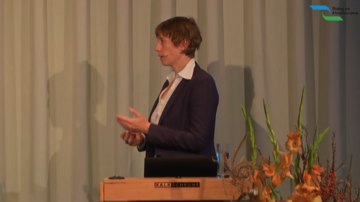
Dr. Jessica Strefler from the Potsdam Institute for Climate Impact Research (PIK) emphasized that challenges of phasing out fossil fuels are rather social than economic or technical. She highlighted the key points for Germany's phase-out from fossil fuels:
- Consideration of regional differences in the challenges of the phase-out,
- avoidance of further (tax-financed) carbon lock-ins, e. g. by investing in gas infrastructure that will become obsolete in the medium term,
- implementation of effective participation formats for citizens, also to strengthen social acceptance,
- compensation of regressive effects of the CO2 price.
Panel discusses challenges of implementing the EU Green Deal
Moderated by Conny Czymoch, Stefanie Hiesinger and Jessica Strefler then discussed the challenges of implementing the European Green Deal together with Carolin Schenuit (Forum Ökologisch-Soziale Marktwirtschaft, FÖS), Dr. Stephan Krieger (Bundesverband der Energie- und Wasserwirtschaft, BDEW), and Frederik Moch (Deutscher Gewerkschaftsbund, DGB). Three video sequences introduced each of the topics that had already been addressed on October 5th and 6th in the preceding virtual Roundtable Series at the Forum Climate Economics 7:
The EU Green Deal in times of Covid-19
The first roundtable had discussed the question of how far current German climate legislation reaches given tightened European climate targets and how the economic policy measures set up to cope with the corona crisis are changing the scope for action in climate policy. Dr. Elmar Kriegler (PIK) presented the following summarizing theses to the Forum:
- The use of fossil energy sources must be reduced rapidly in order to achieve the 1.5° target agreed in Paris.
- The Covid-19 stimulus packages can be used to strike new phase-out pathways. If, however, the packages are used for a return to a CO2-intensive economy, the latter will be cemented for years and the climate targets of the Paris Agreement will be out of reach.
- The EU Green Deal is crucial to initiate transition. Covid-19 reinforces the high need for action. It is now or never for European and national climate protection legislation and for immediate programs to implement the Green Deal!
In the discussion, the important steering effect of the CO2 price on the European level was emphasized. An effective CO2 price could thus become a leading instrument in the German implementation debate, but it would have to be accompanied by further measures: Emission standards in transport and investment funds for the financial compensation of low-income households, which is fed by the revenues of the CO2 price, were listed. However, according to Stefanie Hiesinger, there were currently no plans from the European Commission for a minimum price in the quantity-based emissions trading system.
From the coal industry to the gas industry, is there a threat of a new lock-in?
On October 6th, another roundtable discussed the new path dependencies lurking in the phase-out from coal with a view to the German Climate Protection Plan. Prof. Jan Minx, Ph.D. (Mercator Research Institute on Global Commons and Climate Change) summarised the impressions from this exchange for the forum audience with the following theses:
- Germany has to tighten its climate protection targets and increase its efforts to phase out coal – the highest savings potential in the energy industry in short term.
- A CO2 price is needed as a key climate policy instrument – flanked by additional regulatory measures, the expansion of the EU emissions trading system, and reliability through a minimum price.
- Gas as a “bridging technology” bears the risk of new fossil path dependencies. The focus should be on the expansion of renewables and electricity grids!
The panel agreed that it’s important to focus on organizing the entries. There were different views on alternatives to gas in the electricity sector which could be used to stabilize the networks. However, the heat sector, despite its volume, has been neglected so far. Speaking of practicability, the objection that gas is the only option was countered by balancing the regions in the European electricity grid, demand-side management, and electricity storage as alternative solutions.
In principle, there is a good gas network infrastructure in Germany, the panel said, which should not be recklessly abandoned, although the further expansion of fossil infrastructure would make no sense. The possibility of reallocating the gas networks to the large-scale use of green hydrogen has been discussed with controversy. This proposal was countered by the argument that hydrogen is not a solution to achieve the goal of greenhouse gas neutrality in 2050, partly because of the high conversion losses. The potential in Germany was very limited and would shift problems abroad. Whereas, in other European countries indeed are potentials and the so-called blue hydrogen could be a suitable bridge.
A socially just transition - How can we take everyone with us on the road to a carbon-neutral economy?
Finally, Prof. Dr. Christian von Hirschhausen (Technical University of Berlin) presented the theses from the last roundtable. On October 5th, this roundtable had discussed how the structural change necessary for greenhouse gas neutrality can be designed in such a way that the transition to a carbon-neutral economy is perceived as socially just and is thus jointly supported by society.
- The transition into an emission-free economy must be flanked by regional and social policy instruments. The prices of the negative effects of fossil fuels on the environment must rise and at the same time, a social balance has to be created.
- What other role remains for national and European transition policy in addition to local involvement that is considered important?
- Is the policy of fossil fuel phase-out transferable to the phase-out of natural gas and oil?
- Can lessons be learned from past transitions, such as those in eastern Germany and Europe or from digitization?
The panel assessed Europe as a key player in ensuring a consistent domestic market and in shaping framework conditions. At the national level, communication about the implementation of Brussels' guidelines played an important role. For example, the increase in the rate of renovation demanded by the Commission is quite ambitious and must be pushed forward accordingly by the member states.
With regard to social acceptance, the linking of climate policy goals with employment goals is elementary – especially the more the change affects the everyday life of the population. Unlike fossil fuel phase-out, rising petrol and heating oil costs or structural change in the automotive industry would affect larger sections of the population. This could also cause the currently high approval rates for EU Green Deal in the member states to decline. Nevertheless, a return of appreciation for the natural environment could be observed, especially in the wake of the corona crisis, and the conviction spread that a return to old economic systems could not secure jobs in long term. Therefore, the economic stimulus measures in the course of the corona crisis must apply: Do not revive the old economic structures but seize the opportunity for structural change.
Background Paper
How can the phase-out of fossil energy use be implemented politically for the achievement of ambitious climate protection goals? An analysis of existing policies, processes and proposals aimed at supporting the phase-out of fossil fuels helps to identify effective approaches and how they can be adopted in different regional contexts. A key factor in successfully phasing out fossil fuels is doing so in a socially just manner. Therefore, possible positive and negative distributional impacts of the phase-out on households and consumers on the one hand, and on companies and fossil fuel owners on the other, need to be analyzed.
